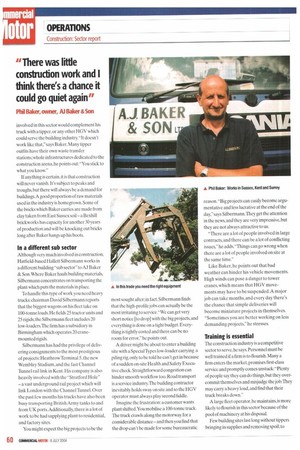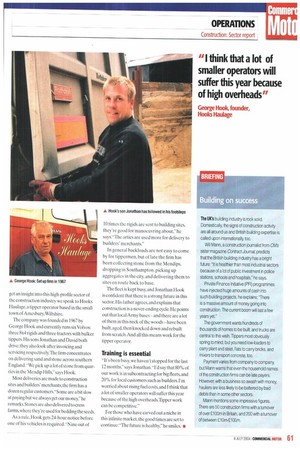"There was little construction work and I think there's a chance it could go quiet again
Page 60

Page 61

If you've noticed an error in this article please click here to report it so we can fix it.
Phil Baker, owner, Al Baker & Son
involved in this sector would complement his truck with a tipper, or any other HGV which could serve the building industry."It doesn't work like that," says Baker. Many tipper outfits have their own waste transfer stations; whole infrastructures dedicated to the construction arena,he points out:"You stick to what you know."
If anything is certain, it is that construction will never vanish. It's subject to peaks and troughs, but there will always be a demand for buildings.A good proportion of raw materials used in the industry is homegrown. Some of the bricks which Baker carries are made from clay taken from East Sussex soil — a Bexhill brickworks has capacity for another 30 years of production and will be knocking out bricks long after Baker hangs up his boots.
In a different sub sector
Although very much involved in construction, Hatfield-based Hallett Silbermann works in a different building "sub sector" to AJ Baker & Son. Where Baker hauls building materials, Silbermann concentrates on transporting the plant which puts the materials in place.
To handle this type of work you need heavy trucks: chairman David Silbermann reports that the biggest wagons on his fleet take on 100-tonne loads. He fields 25 tractor units and 25 rigids; the Silbermann fleet includes 20 low-loaders.The firm has a subsidiary in Birmingham which operates 20 cranemounted rigids.
Silbermann has had the privilege of delivering consignments to the most prestigious of projects: Heathrow Terminal 5. the new Wembley Stadium, and the fast Channel llinnel rail link in Kent. His company is also heavily involved with the "Stratford Hole" — a vast underground rail project which will link London with the Charmer-funnel. Over the past few months his trucks have also been busy transporting British Army tanks to and from UK ports. Additionally, there is a lot of work to be had supplying plant to residential, and factory sites.
You might expect the big projects to be the most sought after; in fact. Silbermann finds that the high-profile jobs can actually be the most irritating to service. "We can get very short notice [to drop] with the big projects, and everything is done on a tight budget. Everything is tightly costed and there can be no room for error," he points out.
A driver might be about to enter a building site with a SpecialTypes low-loader carrying a piling rig, only to be told he can't get in because of a sudden on-site Health and Safety Executive check. Straightforward congestion can hinder smooth workflow too. Road transport is a service industry. The building contractor inevitably holds sway on site and so the HGV operator must always play second fiddle.
Imagine the frustration: a customer wants plant shifted.You mobilise a 100-tonne truck. The truck crawls along the motorway for a considerable distance— and then you find that the drop can't be made for some bureaucratic reason. "Big projects can easily become argumentative and less lucrative at the end of the day," says Silbermann.They get the attention in the news, and they are very impressive, but they are not always attractive to us.
"There are a lot of people involved in large contracts, and there can be a lot of conflicting issues," he adds. "Things can go wrong when there are a lot of people involved on site at the same time."
Like Baker, he points out that bad weather can hinder his vehicle movements. High winds can pose a danger to tower cranes, which means that HGV movements may have to be suspended.A major job can take months, and every day there's the chance that simple deliveries will become miniature projects in themselves. "Sometimes you are better working on less demanding projects." he stresses.
Training is essential
The construction industry is a competitive sector to serve, he says. Personnel must be well trained if a firm is to flourish. Many a firm enters the market, promises first-class service and promptly comes unstuck:"Plenty of people say they can do things, but they overcommit themselves and misjudge the job.They may carry a heavy load, and find that their truck breaks down."
A large fleet operator, he maintains, is more likely to flourish in this sector because of the pool of machinery at his disposal.
Few building sites last long without tippers bringing in supplies and removing spoil; to get an insight into this high-profile sector of the construction industry we speak to Hooks Haulage, a tipper operator based in the small town of Amesbury. Wiltshire.
The company was founded in 1967 by George Hook and currently runs six Volvos: three 8x4 rigids and three tractors with bulker tippers. His sons Jonathan and David both drive; they also look after invoicing and servicing respectivelyThe firm concentrates on delivering sand and stone across southern England."We pick up a lot of stone from quarries in the Mendip Hills," says Hook.
Most deliveries are made to construction sites and builders' merchants; the firm has a dozen regular customers "Some are a bit slow at paying but we always get our money," he remarks Stones are also delivered to cress farms, where they're used for bedding the seeds.
As a rule, Hook gets 24-hour notice before one of his vehicles is required."Nine out of 10 times the rigids are sent to building sites, they're good for manoeuvring about," he says. "The artics are used more for delivery to builders' merchants."
In general backloads are not easy to come by for tippermen, but of late the firm has been collecting stone from the Mendips, dropping in Southampton, picking up aggregates in the city, and delivering them to sites en route back to base.
The fleet is kept busy, and Jonathan Hook is confident that there is a strong future in this sector. His father agrees, and explains that construction is a never-ending cycle. He points out that local Army bases and there are a lot of them in this neck of the woodshave been built, aged, then knocked down and rebuilt from scratch. And all this means work for the tipper operator.
Training is essential
"It's been busy, we haven't stopped for the last 12 months," says Jonathan. -I'd say that 80% of our work is in subcontracting for big fleets, and 20% for local customers such as builders. I'm worried about rising fuel costs, and I think that a lot of smaller operators will suffer this year because of the high overheads.Tipper work can be competitive."
For those who have carved out a niche in this infinite market, the good times are set to continue:"The future is healthy." he smiles. •




























































































































































































